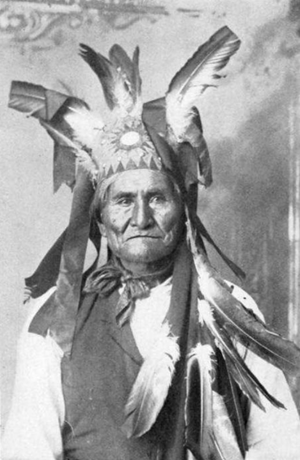Geronimo, born Goyahkla in June 1829 in what is now Arizona, was a prominent leader and medicine man of the Apache tribe. Renowned for his fierce resistance against Mexico and the United States' attempts to subjugate his people, Geronimo became a symbol of Native American resilience and struggle for freedom.
 Geronimo's life was profoundly shaped by conflict. As a young man, he experienced the brutality of Mexican soldiers who killed his family, fueling his lifelong animosity towards both Mexican and later American forces. His leadership skills and determination in battle quickly earned him a reputation as a formidable warrior and strategist.
Geronimo's life was profoundly shaped by conflict. As a young man, he experienced the brutality of Mexican soldiers who killed his family, fueling his lifelong animosity towards both Mexican and later American forces. His leadership skills and determination in battle quickly earned him a reputation as a formidable warrior and strategist.
During the 1850s to the 1880s, Geronimo led numerous raids and defensive actions against Mexican and American forces, resisting efforts to confine the Apache people to reservations. His deep knowledge of the terrain and guerrilla tactics allowed him to evade capture multiple times, even as U.S. forces intensified their efforts to subdue him and his followers.
Geronimo's defiance came to a dramatic end in 1886 when he finally surrendered to General Nelson Miles. His surrender marked the last significant Native American resistance to U.S. expansion, symbolizing the end of the Indian Wars. Despite his capture, Geronimo remained a prisoner of war for the rest of his life, moved between various military installations.
In his later years, Geronimo adapted to his circumstances by participating in fairs and exhibitions, including President Theodore Roosevelt's inauguration parade in 1905. He dictated his autobiography, providing a rare and invaluable perspective on the Apache's resistance and his own life story.
Geronimo died on February 17, 1909, at Fort Sill, Oklahoma. His legacy endures as a testament to the enduring spirit of resistance against oppression and the fight for his people's freedom and way of life. His life story continues to inspire and resonate, highlighting the complexities and challenges faced by Native Americans during a turbulent period of American history. |
 Geronimo's life was profoundly shaped by conflict. As a young man, he experienced the brutality of Mexican soldiers who killed his family, fueling his lifelong animosity towards both Mexican and later American forces. His leadership skills and determination in battle quickly earned him a reputation as a formidable warrior and strategist.
Geronimo's life was profoundly shaped by conflict. As a young man, he experienced the brutality of Mexican soldiers who killed his family, fueling his lifelong animosity towards both Mexican and later American forces. His leadership skills and determination in battle quickly earned him a reputation as a formidable warrior and strategist.









